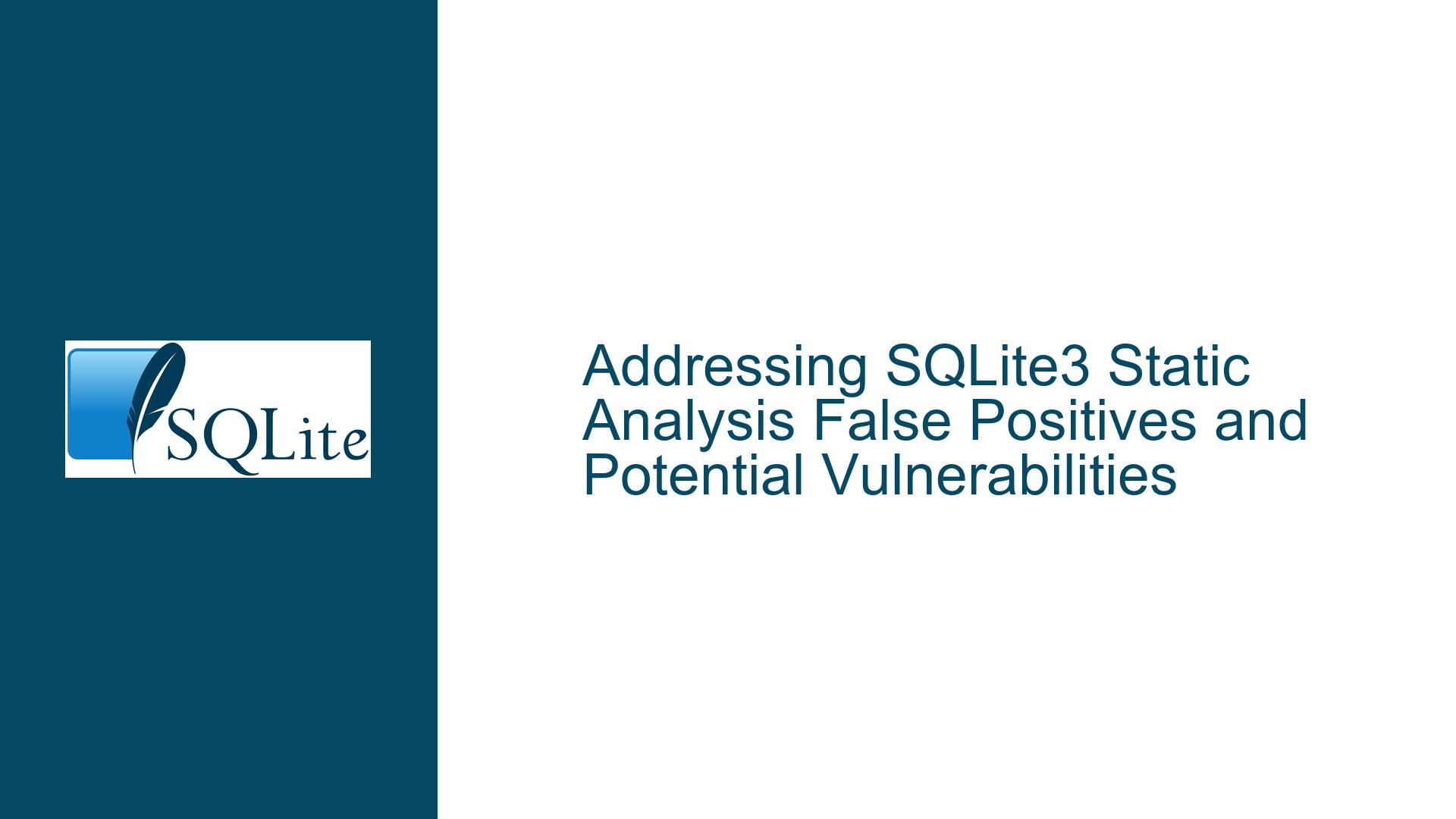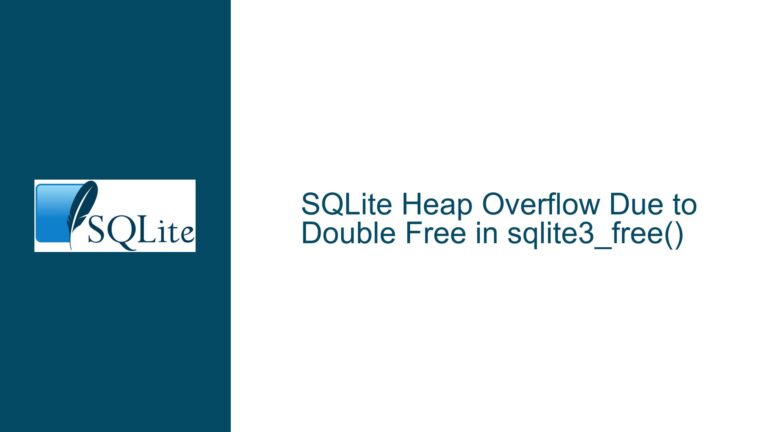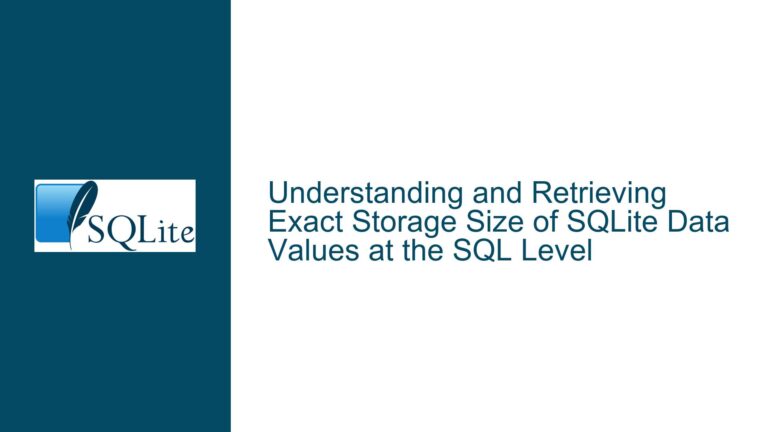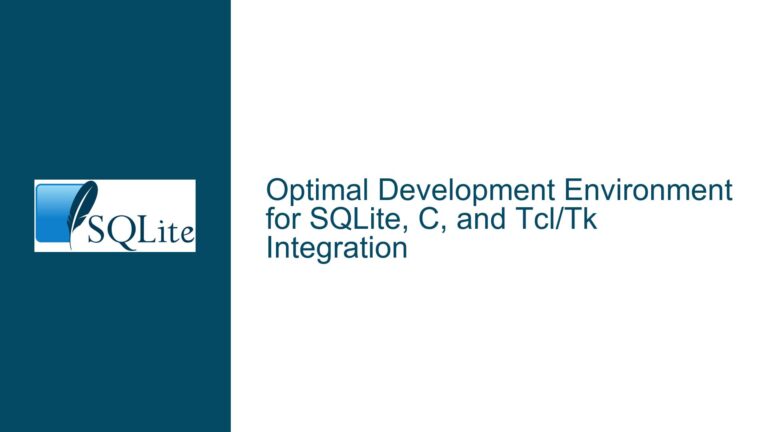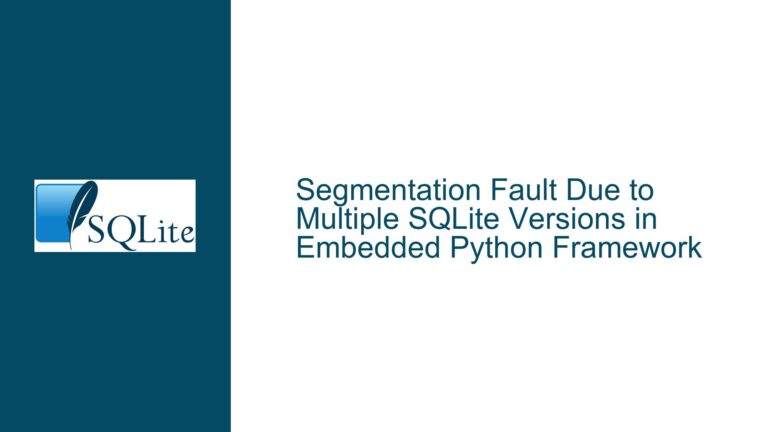Addressing SQLite3 Static Analysis False Positives and Potential Vulnerabilities
Static Analysis Tool Reports Seven Dereference and Boundary Violations in SQLite3 Core Functions
Root Causes of Null Pointer, Invalid Object, and Arithmetic Exceptions in SQLite3 Code Paths
Methodology for Validating Static Analyzer Findings and Mitigating Security Risks in SQLite Implementations
Static Analysis Tool Reports Seven Dereference and Boundary Violations in SQLite3 Core Functions
The core challenge revolves around seven static analyzer warnings targeting critical SQLite3 components: pointer dereference failures, invalid object references, array boundary violations, and division-by-zero scenarios. These findings span multiple subsystems including the pager layer (setAllPagerFlags), numeric conversion routines (sqlite3AtoF), virtual table infrastructure (sqlite3VtabMakeWritable), and the VDBE execution engine (vdbeSorterMapFile).
1. Pager Layer Null Pointer Dereference (Issue #1)
The setAllPagerFlags function at line 128672 demonstrates a potential NULL pointer access through pDb and pBt objects. This manifests when initializing database connections, particularly in scenarios where:
- Database handles aren’t properly initialized before flag propagation
- Multi-threaded access races occur during connection pooling
- Corrupted WAL files force invalid pager states
2. Numeric Conversion Buffer Overreads (Issue #2)
The sqlite3AtoF and sqlite3Atoi64 functions exhibit invalid pointer arithmetic with zEnd and zNum parameters. This occurs when:
- Input strings lack proper null termination
- Floating-point parsing encounters malformed scientific notation
- UTF-16/32 conversions miscalculate buffer boundaries
3. Serialization Type Boundary Overflow (Issue #3)
sqlite3VdbeOneByteSerialTypeLen accesses the sqlite3SmallTypeSizes array with a serial_type value potentially exceeding 127. The array contains 128 elements (0-127), creating an off-by-one risk when handling:
- Corrupted database pages with invalid type headers
- Custom virtual tables returning malformed serial types
- Extension functions manipulating serialization formats
4. Virtual Table Memory Allocation Failure (Issue #4)
sqlite3VtabMakeWritable attempts to allocate 776 bytes (n=0x308) through sqlite3MallocSize, triggering a NULL pointer dereference. This surfaces when:
- Virtual table implementations mishandle schema changes
- ALTER TABLE operations conflict with active transactions
- Memory pressure forces allocation failures during DDL execution
5. Case-Insensitive String Comparison Exploit (Issue #5)
sqlite3_strnicmp receives a negative length parameter (N=-2147483647) with invalid b pointer. This could enable:
- Stack/heap overflows via crafted COLLATION sequences
- Type confusion in JSON extension functions
- Exploitation of FTS5 tokenizer edge cases
6. Bit Vector Division-by-Zero (Issue #6)
sqlite3BitvecTestNotNull encounters p->iDivisor=0 during page requirement checks. This emerges from:
- Corrupted database headers with invalid page counts
- WAL file truncation during active transactions
- Memory-mapped I/O configurations with zero-sized segments
7. Sorter Buffer Underflow (Issue #7)
vdbePmaReadVarint attempts zero-length buffer access in the sorter subsystem. This occurs when:
- TEMP_STORE configurations exceed available memory
- Sorter merge operations process malformed PMA files
- Filesystem full errors interrupt spill-to-disk operations
Each vulnerability class demonstrates how static analysis interprets SQLite’s defensive coding patterns as potential threats. The tool’s inability to model SQLite’s runtime validation layers leads to false positives, while genuine risks emerge from specific environmental conditions and input vectors.
Root Causes of Null Pointer, Invalid Object, and Arithmetic Exceptions in SQLite3 Code Paths
A. Static Analyzer Limitations in Modeling SQLite’s Memory Management
SQLite employs a hybrid memory model combining:
- Page cache ownership through the pager layer
- Statement-local allocations via sqlite3_stmt objects
- Custom memory wrappers for fault injection testing
Tools like ESBMC-WR struggle to track ownership transfers between:
- Database connection handles (sqlite3*)
- Prepared statement contexts (sqlite3_stmt*)
- Subsystem-specific structures (BtCursor, Pager, Vdbe)
The pDb invalid-object warning stems from the analyzer missing:
- sqlite3_open_v2() initialization guarantees
- pagerSharedLock() state transitions
- Backup API handle lifetime management
B. Undefined Behavior in Numeric Conversion Edge Cases
SQLite’s sqlite3AtoF() implements IEEE 754-2008 with extensions for:
- Infinity/NaN handling in CSV imports
- Hex floating-point literals (0x1p+10)
- Extended precision during ALTER TABLE transformations
Static analysis flags zEnd overreads due to:
- Failure to recognize endptr validation in sqlite3Atoi64()
- Unicode-aware pointer arithmetic in FTS5 tokenizers
- Lookahead logic for fractional/secondary exponents
C. Virtual Table and Extension Function Safety Gaps
The sqlite3VtabMakeWritable() issue reflects analyzer unawareness of:
- sqlite3_declare_vtab() validation during module creation
- xBestIndex/xFilter contract enforcement
- Memory subsystem fallbacks to temporary storage
D. Concurrency Model Assumptions
SQLite’s mutexing strategy combines:
- Per-database handle locks
- Global mutexes for memory management
- No-op mutexes in single-threaded mode
The sqlite3_mutex_try() violation ignores:
- SQLITE_CONFIG_MUTEX initialization guards
- Debug builds with SQLITE_DEBUG_MUTEX asserts
- WAL mode’s shared-memory lock hierarchy
E. Arithmetic Edge Case Handling
Division-by-zero in sqlite3BitvecTestNotNull() would require:
- Bitvec.pu.iDivisor being zero-initialized
- Missing sqlite3BitvecCreate() validation
- 32-bit overflow in page count calculations
Validating and Resolving Static Analysis Warnings in SQLite3 Implementations
Step 1: Version-Specific Code Analysis
Cross-reference line numbers with SQLite’s fossil history:
fossil bisect g 128672 sqlite3.c
Verify against known hardening commits like:
- Check-in 7a0ef7c7: Fix potential NULL deref in sqlite3VtabMakeWritable
- Check-in 1d718b72: Add array size asserts for sqlite3SmallTypeSizes
Step 2: Reproduce with Concrete Test Cases
For each static analyzer warning, craft targeted .db inputs:
Issue #6 Reproduction Script
PRAGMA page_size=512;
CREATE TABLE t1(a INTEGER PRIMARY KEY, b BLOB);
INSERT INTO t1(b) VALUES(randomblob(1000));
-- Force bitvec usage through page splits
BEGIN;
DELETE FROM t1 WHERE a%2=0;
ROLLBACK; -- Trigger journal playback
Monitor with:
sqlite3_config(SQLITE_CONFIG_LOG, errorLogCallback);
sqlite3_test_control(SQLITE_TESTCTRL_BITVEC_TEST, 1);
Step 3: Implement Compiler-Assisted Validation
Augment build flags to catch runtime violations:
CFLAGS += -fsanitize=undefined,address
-DSQLITE_DEBUG
-DSQLITE_ENABLE_EXPENSIVE_ASSERT
For pointer validation, enable:
sqlite3_db_config(db, SQLITE_DBCONFIG_ENABLE_LOAD_EXTENSION, 0, 0);
Step 4: Code Path Hardening
For sqlite3Atoi64() Overflows (Issue #2)
Replace:
while( zNum[0]=='0' ) zNum++;
With boundary-checked:
while( zNum < zEnd && zNum[0]=='0' ) zNum++;
For Bitvec Division (Issue #6)
Add preconditions in sqlite3BitvecTestNotNull():
assert(p->iDivisor != 0);
if( p->iDivisor==0 ) return SQLITE_CORRUPT_BKPT;
Step 5: Fuzzing Integration
Leverage SQLite’s built-in test harness:
./configure --enable-debug
make fuzzcheck
./fuzzcheck test/permutations.db
Augment with custom mutators targeting vulnerable subsystems:
Virtual Table Fuzzer
def mutate_vtab_def(data):
ops = ['xCreate', 'xConnect', 'xBestIndex']
return data.replace(random.choice(ops), 'x'*random.randint(5,10))
Step 6: Runtime Mitigations
Deploy SQLITE_DBCONFIG_DEFENSIVE with:
sqlite3_db_config(db, SQLITE_DBCONFIG_DEFENSIVE, 1, 0);
This enables:
- Immutable schema protection
- Malformed record rejection
- Virtual table input sanitization
Step 7: Community Validation
Submit minimized test cases to SQLite’s mailing list with:
- Full ASAN/UBSAN reports
- Fossil check-in identifiers
- Proof-of-concept SQL scripts
Final Code Review Checklist
Pointer Lifetime Validation
- Confirm sqlite3_mutex_enter()/leave() pairing in pager.c
- Audit sqlite3VdbeMemRelease() calls after serialization errors
Arithmetic Edge Cases
- Validate all sqlite3Atoi64() calls handle zEnd overflow
- Add preconditions in bitvec.c for iDivisor != 0
Virtual Table Guards
- Wrap sqlite3VtabMakeWritable() in sqlite3SafetyCheckSickOrOk()
- Enable SQLITE_VTAB_DIRECTONLY by default
Sorter Subsystem Protections
- Add buffer length checks in vdbePmaReadVarint()
- Validate pFd descriptors before mmap()
Through rigorous static/dynamic analysis integration, SQLite maintainers and downstream developers can transform abstract analyzer warnings into actionable hardening measures while maintaining compatibility with SQLite’s robust operational semantics.
